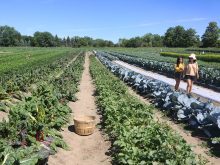Another veteran Agriculture Canada official has been shuffled out of the department, the latest in a series of retirements and reassignments during the past several years.
Many of the department’s veteran senior staff have left in the midst of negotiations over a new five-year farm policy framework. It has not gone unnoticed as the House of Commons agriculture committee is calling for the department to hire more staff with direct knowledge of agriculture.
Effective July 16, Suzanne Vinet will become associate deputy minister of health.
Until next week, she is assistant deputy agriculture minister in charge of the strategic policy branch that has been managing the consultations and design of the new agricultural policy framework that will guide farm policy to 2013.
Read Also

New program aims to support plant-based exports to Asia
Understanding the preferences of consumers in Taiwan and how they differ from Indonesia or Malaysia isn’t easy for a small company in Saskatchewan.
She was a key federal player in negotiations at Whistler, B.C., June 28-29 as federal and provincial ministers struggled to find enough common ground to announce the principles of a new farm policy framework.
On June 29 in Ottawa as she was working the rooms in Whistler, prime minister Stephen Harper was announcing her new assignment in Ottawa.
Vinet has spent two decades in the agriculture department, beginning in 1984 and working her way through various management levels in the areas of policy and international relations.
She spent almost three years at the international trade department before returning to Agriculture Canada in 2005 as assistant deputy agriculture minister in charge of strategic policy development.
Vinet is the latest in what has been a clear-cutting of senior departmental staff in the past two years.
Last winter, Harper shook up the senior management in the department, sending deputy minister Len Edwards to the foreign affairs and trade department and replacing him with first-time deputy Yaprak Baltacioglu, a veteran of agricultural policy wars through a career in the agriculture department and then in environment and the privy council office advising the cabinet.
But many of the senior officials in the department have little connection to the history of the agricultural policy battles over the years and the nuances of federal-provincial relations that colour that history. Provincial critics of the federal government suggest that makes the inexperienced civil servants susceptible to the political dictates of the Conservatives.
Meanwhile, in a report tabled at the end of June, the Commons committee said the department should work with provinces and universities to recruit staff with knowledge of agriculture.
MPs on the committee said they were not questioning the competence or professionalism of staff but noted that Agriculture Canada faces a huge challenge in hiring staff to replace baby boomers expected to retire in large numbers during the next five years.
During hearings across the country, “industry representatives mentioned that over the past few years, they have noted in their dealings with officials an erosion of their knowledge about day-to-day agricultural realities,” said the report.
















